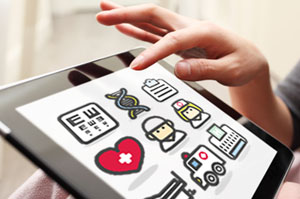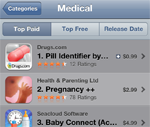Want to monitor your blood pressure and sugar level? Eat healthier meals? Screen yourself for depression? Find out if you need glasses? Now you can do it all with apps on your smartphone.
In fact, there are 40,000 medical applications available for download on smartphones and tablets—and the market is still in its infancy. But that growth is in the crosshairs of new regulatory efforts from the Food and Drug Administration.
Medical apps offer the opportunity to monitor health and encourage patient wellness on a moment-to-moment basis, instead of only during the occasional visit to the doctor’s office. Some even replace devices used in hospitals and doctors’ offices, such as glucometers and the high-quality microscopes used by dermatologists to examine skin irregularities.
“There’s a lot of enthusiasm now about for the ability to use design and to use consumer technology to help improve people’s health at the ground level,” says Andrew Rosenthal, who works for Massive Health, a mobile health app company in San Francisco.
But so far, the market has been something of an unregulated Wild West; for doctors and patients alike, it is difficult to know which apps actually live up to their health claims or provide accurate information.
Last year, the FDA began to lay down the law. The agency released a first draft of guidelines that require mobile apps developers making medical claims to apply for FDA approval for those applications, the same way that new medical devices must be proven safe and effective before they can be sold. But that process can be both time consuming and expensive.
Some app developers are bristling at the thought of a rigid regulatory structure, which they fear will stifle innovation in an industry known for rapid growth and flexibility.
“The FDA’s current regulatory process was created when the floppy disk was around” — ancient history in the tech world, warns Joel White, executive director of the Health IT Now Coalition, which includes the computer chip maker Intel, pharmacy benefit manager Medco, Verizon, Aetna and the U.S. Chamber of Commerce.
According to the Government Accountability Office, the FDA takes about six months to approve a medical device that is similar to an existing product and 20 months to approve a brand new device. That’s simply too slow, says White.
“We’re seeing mobile apps updated and created on a daily basis,” he explains. “The lifecycle is dramatically different.”
It’s also expensive: the cost of getting FDA approval for a standard medical device is about $24 million to $75 million, according to a Stanford University report.
The health app market currently is worth about $718 million and is expected to double by the end of the year, according to Research2Guidance, a global mobile research group.
Protecting Consumers
Alain Labrique, who directs a global project at Johns Hopkins University dedicated to mobile health technology, says that although the FDA guidelines could delay some tech development, they are an important consumer safeguard.
Labrique argues that many apps are “a lot of hype and very little evidence.” While apps offer an exciting new opportunity in health care, “we also want to protect the public and be sure that medical claims are supported by data assessment and some comparison to a gold standard.”
In particular, he warns that commercial interests and “the tendency to capitalize on the next big things” may lead app developers to overstate what their products can accomplish. “Making sure the public’s best interests are met is not always the most expedient process.”
The FDA expects to release final guidelines on mobile health apps this year, but some app developers aren’t waiting. Many companies have started the formal application process, and the FDA has already approved a handful of apps.
White says that many app developers are not opposed to regulation, but they believe that the FDA process doesn’t fit the industry. He suggested that the government set up a new regulatory framework for mobile health—something like the Transportation Safety Board—to accommodate the speed, flexibility and innovation of this new marketplace.
Dr. Orrin Franko, 29, is part of a new breed of doctor-innovators in the mobile health industry. He’s an orthopedic surgery resident at the University of California San Diego and runs a website called TopOrthoApps.com, where he reviews orthopedic apps for doctors and patients. He is also busily developing several of his own.
Recently, he invented a plastic attachment that works with an app that allows iPhones to measure the curve of the spine to test for scoliosis. It mimics a medical device called a Scioliometer, which is used in nearly every hospital across the country. The Scoliometer costs about $100 and was cleared by the FDA in 1983; the iPhone app costs $0.99, and Franko says his plastic attachment could be sold for about $10.
But he also knows that his device will have to be approved by the FDA, requiring a significant capital investment. He’s planning to apply, he says, but with so many new apps coming on the market “there’s no way the FDA is going to keep up.”
Instead, he predicts, app developers with products that are not strictly medical, such as a healthy eating app, may avoid making medical claims in their marketing in order to skip the FDA process and will rely on good user reviews instead to generate publicity.
While the FDA sorts the process out with developers, Franko isn’t wasting any time. In January, he helped launch the peer-reviewed Journal of Mobile Technology in Medicine to help doctors make sense of the bonanza of medical apps.
Franko’s goal is to make sure doctors and patients know what they’re getting as quickly as possible. “These apps already exist,” he explains, “and people are using them in hospitals to make medical decisions, but no one knows if they’re actually doing what they’re claim to be doing.”









